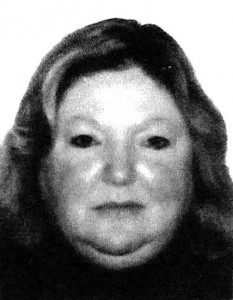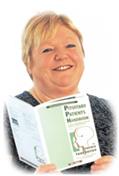I have always been a busy person. I had two children in the 1970s, and I was a very active mother and wife. After I divorced my first husband, I worked part-time as a florist delivery driver. A short time later, I re-married and went to college for 2 years to train as a medical secretary, after which time I worked full-time, looked after my family, coping with the everyday stresses of life.
I was born in October 1955 and have suffered several health issues since I was a child. From as far back as my childhood and into my adult life I used to say to my parents, friends, and now ex-husbands, that “I did not feel well,” but no one would listen to me. Friends and family would often say, “Oh, you’re all right, stop fussing; you will be fine as the day goes on, or you will be fine when you get to work.” I was always made to feel as though my complaints were merely because I really did not want to go to school, work, or a given social event. I began to feel like everything was all in my mind, and I was worried that I was going crazy. I felt that I could not mention my concerns to other people because I already knew what their response would be.
In July 2006, the company for which I worked disciplined me because of my many absences for sickness. In August 2006, I was forced to resign my position. I took the company (The Royal Bank of Scotland) to Employment Tribunal, but even though it was found that they had acted wrongly, I was unable to get any compensation. Because I felt ill all of the time, I was unable to work. I had put on so much weight; I could neither bend nor move. It was difficult to walk because my ankles were so swollen, and my stomach was as large as a 9-month pregnancy. I had hair under my chin and down my back, and the hair on my head was getting thick and curly. I developed a fatty hump on my back at the base of my neck. I looked and felt dreadful.
In 2007, I had a visit from a doctor from the Department of Works and Pensions who came to assess me for disability needs. The doctor was with me for an hour asking questions about what activities I could perform, such as, putting on my shoes, which the doctor could clearly see I could not, because of my huge stomach. I could not see my feet, and I could not bend. At the end of the assessment, the doctor asked if she could write to my personal doctor to suggest that I may be suffering from Cushing’s disease.
On receiving the letter from the doctor from the Department of Works and Pensions, my doctor requested that I see an endocrinologist; I made a private appointment so that I could be seen more quickly than the National Health waiting list. The endocrinologist said to me, “No, you do not have Cushing’s disease;” however, he gave me an overnight tablet to take, and I was scheduled to have a blood test the following morning. The endocrinologist said that he would repeat the tests in another 3 months as he was unable to determine whether or not I had Cushing’s disease; he told me that I would need a week-long test that involved taking tablets, passing urine, and going daily to the hospital for a blood test and to have my urine analyzed. While I was waiting for the next appointment to start this test, I had a chest x-ray and also an MRI scan. The MRI scan revealed a large tumor (6 mm) on my pituitary gland. The week-long blood and urine tests showed I had extremely high levels of cortisol.
In early 2008, I was referred by the endocrinologist to see a professor of surgery, at Stoke City General Hospital, a distance of about 45 miles from my home. The professor told me that I had a pituitary tumor and showed me the MRI scan pictures of the tumor on the pituitary gland. The professor said I had no doubt been suffering from this condition for 20–25 years or more. The professor said I had no choice; the tumor had to be removed. Arrangements were made for my surgery with the neurosurgeon; it was Easter 2008. I had never been a patient in the hospital before, so I was frightened. I remember thinking on my way to the hospital, as I looked at the beauty of the fields, hedgerows, trees, and sky, wondering if I would ever see this beauty again. However, my fears were unfounded as I received excellent care at the hospital where I stayed for 6 days.
I was so pleased and very thankful to see the hedgerows, trees, sky, and fields when I travelled home; however, I had no idea just how much of an ordeal I was yet to face. I had been home from Stoke Hospital for 3 days when I was rushed to my local hospital with suspected postoperative meningitis. Thankfully this was not the case, and I was allowed home after 3 days. It was thought that I had a reaction to the packing that is used in the nose after transsphenoidal surgery. After discharge from Stoke City General Hospital, I was referred back to the endocrinologist at my local hospital for regular check-ups.
It took just over 2 years to recover from surgery. I was extremely weak and very tired. I slept all day and all night, only getting up only to eat small meals and to drink water. I had no quality of life as I spent all my time in bed. At my next regular check-up, I told my endocrinologist that my life was just not worth living. I was sick of being in bed, but I had no energy to do anything else. The endocrinologist made arrangements for me to have my growth hormone levels checked. It was found that I had no growth hormone function at all as the tumor had destroyed the part of the pituitary that made growth hormone. After qualifying for growth hormone injections, I was surprised to find that I started to take an interest in my life once again as I was able to stay awake for longer periods of time.
At my routine check-up 6 months later, I related how much the growth hormone injections had improved my life. However, I told my endocrinologist that I had a lot of pain in my muscles and joints, so much so that it was reducing me to tears. I related the fact that I could not live the life I once had because of fatigue; my hands and fingers were so puffy that I was unable to hold vegetables to peel them. If I stood for too long, the pain in my spine was unbearable; my legs felt as though they did not want to hold me up; my leg muscles were very weak, and the bones in my hips, shins, and feet hurt all of the time.
It has been five 5 years since my surgery. I still have routine check-ups at the hospital to keep an eye on my cortisol levels. I still suffer tremendous pain in the muscles and joints of my spine, neck, arms, legs, and feet. I am also very warm all of the time. I was recently told that I was probably suffering from cold-turkey effects from having less cortisol, similar to what alcoholics and drug addicts experience when they try to abstain from their drug of choice; this is because of the high levels of cortisol that were whizzing around my body for so many years that my body craves cortisol and that is what is causing this devastating pain reaction.
I have had to learn a new way of living my life. I still get very tired if I do anything out of my daily routine; for example, if I go out for the day to visit a friend, I have to rest for the next day or two. I still have a large stomach, nor am I able to lose weight. I need assistance opening bottles and tins and dressing so I have lost some of my independence. I now require help to live my life. I have someone clean my house and prepare my meals, because I cannot lift heavy saucepans from the stove as I may drop them as a result of the weakness in the muscles of my hands, wrists, and arms.
Because my life is so different now, I had to find something to do that would give me a purpose in life but that would also allow me to rest when I needed; I felt that with all I had been through, I never wanted anyone else to feel as alone as I had. My family tried to be understanding, but they could never know the depth of what I really experienced, especially the pain. If I tried to give friends and family a detailed account of how life really was for me, I noticed that they often ended the conversation, saying that they had better dash off somewhere. No one really wanted to know the details of how I felt. I felt such despair; no one was listening to me: hearing maybe but not listening. It was this loneliness and despair that made me search for other pituitary patients who felt exactly as I did
In November 2010, I formed The Shropshire and Mid-Wales Pituitary Group; I did not want anyone to feel as alone as I had through my pituitary journey. Group members from the Shropshire and Mid-Wales Pituitary Group go into the community to raise awareness of pituitary disease among lay persons and medical professionals who often miss these crucial diagnoses; we have discovered that few people know anything about pituitary disease or indeed anything about the pituitary gland, where it is situated in the body, and how important it is for normal bodily function. Because the pituitary gland is the master gland of the body, its importance cannot be underestimated.
Raising awareness of pituitary disease does mean that I have to rest well before going out into the community, as talking to people sorely tests my energy levels. When I get too tired or stressed, I cannot concentrate, and I start to lose co-ordination; my brain does not seem to function properly. I have to “recharge my batteries,” for I seriously feel like “my batteries” are running low; it really is a very frightening feeling of disorientation and a strange sinking feeling. I have to sit down, have a drink, and eat some food and then I am ready to go again.
The Shropshire and Mid-Wales Pituitary Group has become my passion and my focus; it gives me a purpose in life where I can help and support those who suffer a pituitary disease. The Shropshire and Mid-Wales Pituitary Group is here for you, wherever you live.
Member: 132055
Newsletter: Summer, 2013
England








Sorry, comments are closed for this post.